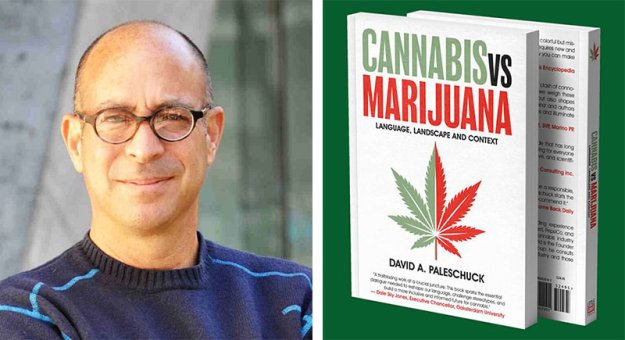 Legalization in states across the country has led to a reassessment of the word "marijuana." Is it a dated term with racist roots? Many advocates seem to think so. I'm not one of them. Now, Cannabis vs Marijuana: Language, Landscape and Context, a new book by David Paleschuck, dives into the debate. It's a polemic with just one point of view on the cannabis vs. marijuana subject. In the intro, he writes:
Legalization in states across the country has led to a reassessment of the word "marijuana." Is it a dated term with racist roots? Many advocates seem to think so. I'm not one of them. Now, Cannabis vs Marijuana: Language, Landscape and Context, a new book by David Paleschuck, dives into the debate. It's a polemic with just one point of view on the cannabis vs. marijuana subject. In the intro, he writes:
In the past, the term 'marijuana' was primarily utilized in a derogatory manner, often associated with negative stereotypes and racial biases, particularly in the context of 20th Century America. Its derogatory connotations were intertwined with xenophobic and racially discriminatory sentiments, contributing to stigmatization and criminalization of cannabis use within specific communities. Conversely, the term 'cannabis' has been utilized in a more neutral and scientific context, often associated with its botanical properties and medicinal potential, transcending the negative cultural associations attached to "marijuana."
It's the premise of the book: Cannabis good, marijuana bad.
Paleschuck doesn't care much for slang terms either. In the opening title chapter, he explains:
Terms like 'weed,' 'pot' and 'bud' have become ubiquitous in popular culture and are often used to refer to cannabis in a casual or colloquial context. While these terms can help to create a sense of community and shared experience among cannabis consumers, they can also be seen as reinforcing negative stereotypes and limiting the public's understanding of the plant and its potential benefits.
Paleschuck continues:
The shift from "marijuana" to "cannabis" in public and legal discourse signifies a deliberate move towards a more neutral, scientific lexicon that reflects the plant's legitiamate use and distances it from historical and legal stigmatization. "Cannabis" invites a perspective that respects its medicinal and adult use, aligning with a global trend toward legalization and regulation.
Rather than explain the etymolgy of the so-called racism of the word marijuana, the author quotes Clarity PAC's Gary Stein, who says about Mexico:
The plant gained respect among indigenous people who referred to it as "marijuana." However, in the US, Harry Anslinger, the first commissioner of the Bureau of Narcotics, appropriated the term to promote anti-Mexican sentiment during Prohibition.
That is all conjecture and has never been effectively proven. I've spoken to several Mexicans who have no issue with the word marijuana. It's unclear even where it came from. According to a 2023 NPR article:
The Spanish brought cannabis to Mexico to cultivate it for hemp... One theory holds that Chinese immigrants to western Mexico lent the plant its name; a theoretical combination of syllables that could plausibly have referred to the plant in Chinese (ma ren hua) might have just become Spanishized into 'marijuana'... Maybe the term simply originated in South America itself, as a portmanteau of the Spanish girls names Maria and Juana. The mystery of marijuana's name is appropriate for this incredibly many-faceted plant.
Later, Paleschuck concludes:
In shaping a more inclusive and respectful language surrounding cannabis, we must challenge ourselves to find alternative, more accurate, nuanced and inclusive ways of expression.
The rest of the book is less controversial. Paleschuck breaks down the differences between indica and sativa, "use" and "consume," "decrim" and "legalization," "adult use" and "recreational," and stresses that "cultivar" is preferable to "strain." Chapters on "black market" vs. "legacy" and "rescheduling" vs. "descheduling" are particularly illuminating.
These days I use both terms, cannabis and marijuana. Since industry people like cannabis better, I use it more often. When being historical or referring to an arrest, it's marijuana. We can use both appropriately without erasing history.
— Steve Bloom for CelebStoner, May 10







Recent comments
2 weeks 3 days ago
2 weeks 4 days ago
5 weeks 4 days ago
6 weeks 4 days ago
10 weeks 4 days ago
14 weeks 2 days ago
18 weeks 3 days ago
19 weeks 1 day ago
29 weeks 1 day ago
33 weeks 1 day ago